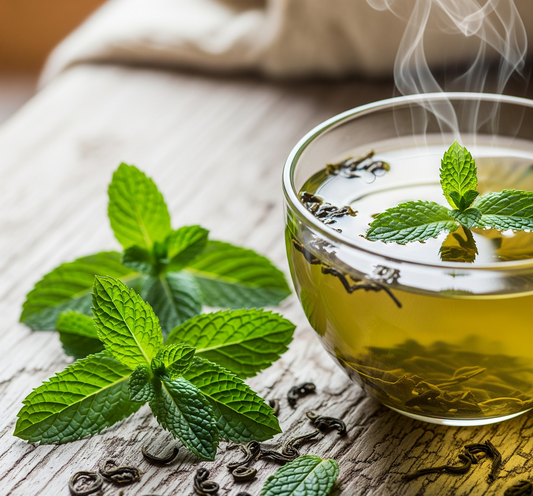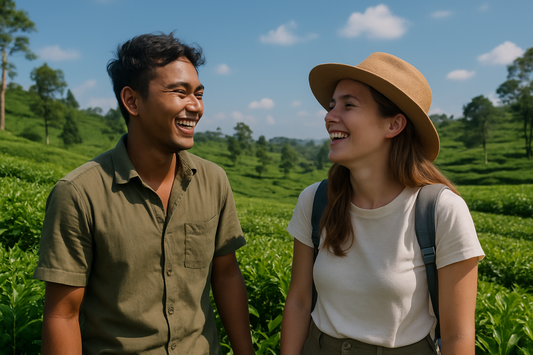Since tea bags first came into use, tea connoisseurs have held the use of tea bags in low regard, preferring the fragrance and aroma of loose-leaf teas. This bias arises from mass-produced tea bags that have flooded the market for most of the history of modern tea culture and is often not representative of tea bags crafted with care.
The tea bags many of us are most familiar with are flat tea bags made of bleached filter paper, packed with broken tea leaves and/or Fannings (tea leaf dust). While these grades of teas have their own uses, benefits and special qualities suitable for certain kinds of teas and medicinal brews, the rich color and relatively blander flavor and aroma of these brews are generally not preferred by those accustomed to loose-leaf teas.
Since 2016, Nepal Tea Collective has been a purveyor of Nepali orthodox loose-leaf teas. As a tea-expert and a lover of tea, our founder Nish has built friendships spanning the entire world that share the love for loose-leaf tea from Nepali highland tea gardens. Whether you’re a tea-expert, a connoisseur of loose-leaf tea, or simply just a tea drinker looking to try some unique loose-leaf flavors, there has always been and always will be space for you within the collective!

This year, we’re also seeking to slightly break with the loose-leaf only tradition and welcome tea-bag lovers to the collective. We often field questions about brewing loose-leaf teas: what tools are necessary, how long to steep the leaves, and especially, how much loose leaf to use for each serving – something that even the Nepal Tea team can get wrong in our daily brews – from tea drinkers unaccustomed to loose-leaf tea.

This is why we’ve always wanted to be able to provide our whole-leaf tea in pre-packed, low-waste tea bags for an easy and convenient brewing option. We were lucky to have met Alexandra from Sarjesa Inc, who made our foray into tea bags even smoother and more exciting for us!
On her way to an Indigenous Studies class one morning, the idea for Sarjesa came to Alexandra when she dropped into her favorite coffee shop. Scanning the menu, Alexandra was struck by the thought that by buying a cup of coffee, she was helping the coffee shop support small and indigenous businesses all over the world.
Alexandra went on to found Sarjesa, a local tea company working in the space of creating high-quality, fresh and delicious tea blends to support marginalized communities. Their teas are sourced ethically from local farmers, suppliers and foragers, along with international farms practicing restorative agriculture and working to support women in the region.
Hand-blended on Treaty 7 territory, which is the homelands of the Niitsitapi (the Siksika, Piikani, Kainai), the Îyârhe Nakoda, the Tsuut’ina Nations, as well as Métis Nation Region 3, each package of Sarjesa’s teas raises awareness about the racialized violence against Indigenous women. Information about the cause is printed on each box of tea. These handcrafted tea-blends, women’s stories, and the beautiful artwork featured on each package of tea is one way to honor the lives and the memory of the women who have gone missing or have been murdered.
With the inspiring and crucial mission of supporting violence prevention programs for women in crisis, Sarjesa makes yearly donations to the Awo Taan Healing Lodge Society from the revenue generated with their teas.
Our Collaboration:
Just like Nepal Tea Collective, leveraging high-quality teas as a catalyst for social change is at the heart of Sarjesa’s mission. Thanks to the internet, Alexandra met our team through Linkedin and found that we were aligned in our mission and values.
“I reached out to them because I thought they might appreciate working with a small manufacturing facility to produce their products. It has been awesome to work with them and learn about their needs. We had several meetings to map the designs and went through the process of organic certification to meet their needs,” Alexandra says. Answering pertinent questions for our tea-drinkers curious about our tea bags, here’s Alexandra:
Q: How are the tea bags designed?
Alexandra: We have a number of options for tea bags, so design always begins with a discussion around the customer need you are addressing. Some tea bags are designed for quick use while others require a longer steep time. We went with a pyramid bag for this project because it helps the leaves unfurl and creates a more nuanced taste.
Q: What is the production process like for our tea bags and how do we ensure quality control?
Alexandra: There are a number of steps in place for quality in accordance with the Canadian Food Inspection Agency (CFIA) and current Good Manufacturing Practice standards, rigorous certifications and site audits ensure that we are continuously improving our systems.
Q: What was the production timeline like?
Alexandra: This project took longer to complete because there were some special steps like organic certification. However, normally a first run takes 4-6 weeks, depending on how long it takes for the initial materials and packaging to arrive. After that, it usually takes 3 weeks from the time of the first order.
Q: Did you encounter any challenges during the production process?
Alexandra: When we first started manufacturing tea bags, absolutely! So much depends on the type of tea or tisane and how it flows through the equipment. Just last week, I connected with other tea makers on how to get chamomile to run smoothly. It can be a challenge and a chance to learn.
Q: What are the materials we are using? Why did you choose to work with these materials?
Alexandra: We chose to go with a commercially compostable material for this product. I think that compostable is the way to go. Unfortunately, home compostable materials for pyramid bags require a large minimum order quantity for custom printing, and there was some concern that the QR codes would not scan on the tags. So, we went with commercially compostable for the first run, working with tea materials supplied by NTC. We hope to move on to using home compostable materials soon.
Our collection of organic whole leaf tea bags will be available on September 1st! Our buyers’ favorites, Kanchanjangha Noir black tea (Himalayan Sunrise), Kanchanjangha Verde green tea (Himalayan Mist), Nepali Breakfast chai blend, and Kathmandu Cosmos Decaf herbal blend will be available in easy to brew tea bags, made for our tea lovers on the go!





